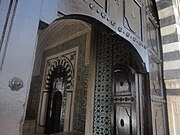Manouba
Manouba | |
|---|---|
 Manouba Military Museum | |
| Coordinates: 36°48′28″N 10°6′4″E / 36.80778°N 10.10111°E | |
| Country | |
| Governorate | Manouba Governorate |
| Delegation(s) | Manouba |
| Government | |
| • Mayor | Slim Ben Amara (Independent) |
| Population (2022) | |
| • Total | 36,194 |
| Time zone | UTC1 (CET) |
Manouba (Arabic: منوبة ) is a city in north-eastern Tunisia, and is part the metropolitan area of Tunis, also called "Grand Tunis".[1] It is located at the west of Tunis city center at around 36°48′28″N 10°6′4″E / 36.80778°N 10.10111°E. It is the capital city of Manouba Governorate.
Manouba is well known for its university. It is also often viewed as a desirable place for family life because of its security, availability of various services and its high level of education.
History
[edit]Historically, Manouba is noted as the birthplace of the sufi saint Sayyida ʿĀʾisha al-Mannūbiyya (1199–1267 CE), and until 2012 the city contained a shrine to her, supposedly her father's house. It was customary in the nineteenth and early twentieth centuries, for the Beys of Tunis to make a ritual circuit of city's the great shrines on the 27th day of Ramaḍān (laylat al-Qadr) and visit this shrine. More recently, 'up until the Tunisian revolution of January 2011, once a week, on Sundays or Mondays, rituals were held ... During the day, the shrines were women's space, devoted to music and trance rituals. At night, they became men's space, dedicated to Ṣūfī ceremonies (dhikr ...)'. However, on 6 October 2012, the shrine was burned down by religious extremists, thought to be young Salafis; ʿĀʾisha's catafalque was entirely destroyed.[1]
The Institute of Arabic Literature of the White Fathers, which would later become the Pontifical Institute of Arab and Islamic Studies, had a study center in Manouba before it was moved to Rome in 1964.[2]
Gallery
[edit]References
[edit]- ^ a b Boissevain, Katia. "al-Mannūbiyya, Sayyida ʿĀʾisha". In Fleet, Kate; Krämer, Gudrun; Matringe, Denis; Nawas, John; Rowson, Everett (eds.). Encyclopaedia of Islam (3rd ed.). Brill Online. doi:10.1163/1573-3912_ei3_COM_24813. ISSN 1873-9830.
- ^ "Our history Pontifical Institute for Arabic and Islamic Studies". en.pisai.it. PISAI - Pontificio Istituto di Studi Arabi e d'Islamistica. Retrieved 13 January 2024.





